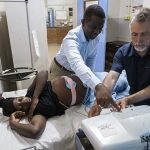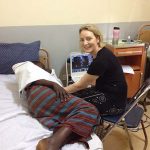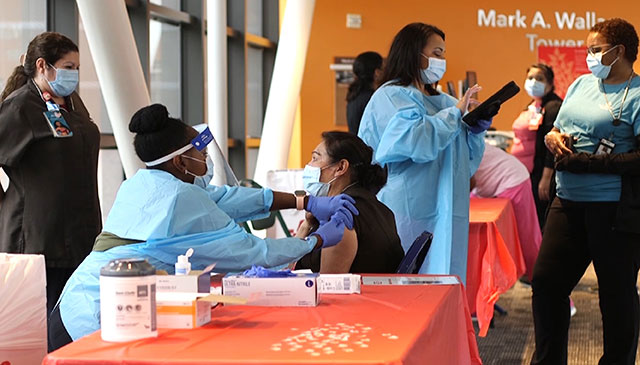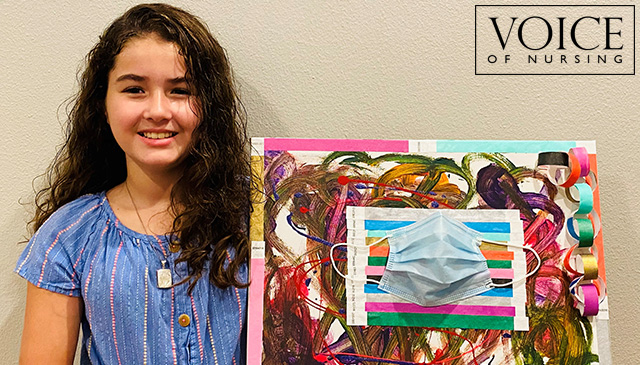The story you are about to read is part of an ongoing series about Texas Children’s efforts to care for women and children around the globe. The series highlights Texas Children’s efforts in Malawi, one of the 17 countries we currently serve. Today’s story focuses on how Texas Children’s and Baylor together have expanded the scope of services they offer around the world due to the success their programs have had with diagnosing and treating children with HIV/AIDS.
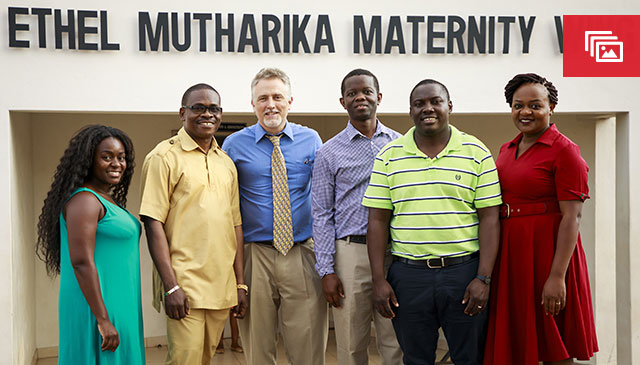
The foundation of what Texas Children’s and Baylor College of Medicine are doing in Malawi and six other countries across sub-Saharan Africa and Romania lies in the diagnosis and treatment of children with HIV/AIDS. The public-private partnerships formed over the years however now tackle other conditions in the developing world such as cancer, tuberculosis, malaria, sickle cell and malnutrition. They also focus on women, not just children and have expanded this work to Latin America.
“Texas Children’s in partnership with Baylor College of Medicine has created one of the strongest global health programs for children and women in the world,” said Texas Children’s Executive Vice President Dan DiPrisco. “The program started out with a narrow focus but has expanded its reach due to its success and dedication to its mission of providing quality health care, education and research in low-resource settings.”
In addition to operating the Center of Excellence in Malawi, Texas Children’s and Baylor College of Medicine provide staff to support the pediatric ward at Kamuzu Central Hospital in Lilongwe, Malawi’s capital city. Staff also works in four busy government health centers in other areas of Lilongwe and performs outreach across the entire country. Texas Children’s and Baylor employ the only pediatric surgeon in the region, a cardiologist and a team of OB/GYNs. They also provide care and training for emergency medicine and have developed a robust oncology program called Global HOPE.
Below is a brief overview of some of these programs and how they are saving lives.
Surgery
Children living in resource-limited settings often lack access to doctors trained in both routine and advanced pediatric surgical and post-operative techniques. This holds very true in Malawi, where there are four pediatric surgeons practicing in the country – our Texas Children’s/Baylor College of Medicine surgeon in the capital, Lilongwe, and three surgeons in Blantyre, the largest city.
Dr. Bip Nandi is the surgeon in Lilongwe at Kamuzu Central Hospital. Being the only pediatric surgeon in a city of one million and a region of more than seven million, he performs about 500 surgeries each year. Some of his patients are just a few days old.
“We don’t take the decision to operate on these children lightly,” Nandi said. “But most of them would not survive without an operation.”
In addition to performing much-needed operations, Nandi said he spends a lot of his time training, teaching and building capacity, all of which are critical to sustaining a strong surgery program in low-resource settings. He is currently working with one local surgeon who is halfway through his general training and hopes to be working with another two soon with the goal of in five years having at least three locally trained pediatric surgeons. Nandi also is working to bolster anesthesiology and nursing as well, both of which support surgery and are key to its success in any setting.
“It’s important to have the institutional support that Texas Children’s and Baylor provide,” he said. “Up until now, we’ve done everything on a wing and a prayer, and you can only get so far on that.”
Maternal Care
Women are essential to social and economic progress yet they shoulder some of the greatest burdens of preventable disease and death. According to the World Health Organization, 303,000 women died as a result of pregnancy and childbirth in 2015 alone, disproportionately in poorer regions of the world. These women often leave children without anyone to protect and care for them, which contributes to staggering under-5 mortality rates. In 2015, 5.9 million newborns and toddlers died.
Since a child’s health is so dependent on its mother’s health, Texas Children’s and Baylor College of Medicine collaborate with public and private partners in regions of greatest need to increase access to and improve delivery of women’s health services. These wide-ranging obstetric and gynecological services include family planning, maternity care, and identification of preexisting conditions that may hamper a healthy delivery such as malnutrition, obstetric fistula, TB and HIV.
Texas Children’s offers community education on the benefits of smaller families, childhood nutrition and a host of other maternal and child health subjects, and its clinical research leads to better outcomes for mothers and children worldwide.
In Malawi, the program helped start the country’s first OB/GYN residency program at the University of Malawi College of Medicine in Lilongwe. Work also includes providing direct OB/GYN services to patients, operating two surgical care centers and training local healthcare providers. U.S.-based residents and fellows from across the U.S. rotate through our program in Malawi, which helps build their skills in a high-volume setting. In Malawi we support more than 6,000 deliveries and 300 c-sections annually. The organization also trains fellows interested in working in global women’s health.
In 2020, Texas Children’s began a new partnership with the International Federation of Obstetrics & Gynecology (FIGO) to support the FIGO Fistula Surgery Training Initiative (FSTI). This program identifies and trains local surgeons, and establishes local training and surgical centers to repair obstetric fistula. There are FSTI training centers in more than 20 countries around the world as well as a Fistula Surgery Training Manual translated into numerous languages.
On behalf of Texas Children’s and Baylor, Dr. Bakari Rajab works with KCH to supervise Malawi College of Medicine residents, teach the fellows from Houston while they are on their two-year rotation, and coordinate various specialized faculty who come to Malawi to help. He also looks after the mothers in the Teen Mother Program, following them throughout their pregnancies and deliveries.
“Having a strong partnership between OB/GYN and pediatrics is so important,” Rajab said. “We try our best as OB/GYNs to keep a mother and her baby healthy and alive during pregnancy. Once the baby is born, as an OB/GYN, you want to see that hard work continue and help toward making that baby into a functioning, well-developed human being.”
Global HOPE
Texas Children’s Global HOPE (Hematology-Oncology Pediatric Excellence) is focused on building long-term capacity to treat and dramatically improve the prognosis of children with cancer and blood disorders in sub-Saharan Africa. The program’s vision is to ensure that children with cancer and blood disorders in Africa receive the most effective therapies available, and ultimately experience treatment outcomes comparable to those in resource-rich settings.
The program operates in four African countries, including Malawi where they diagnose and treat pediatric cancer and hematological cases at Kamuzu Central Hospital. Global HOPE has sent physicians from Texas Children’s to KCH in Lilongwe since 2010. In 2016, the first patient diagnosed with leukemia at KCH was successfully treated by our physicians.
Since then, the program in Malawi has grown, additional patients have been successfully treated, local physicians have been trained and much-needed supplies have been made available.
“We have made a lot of progress in a relatively short amount of time,” said Dr. Nmazuo Ozuah, who oversees Global HOPE’s operations in Malawi. “Capacity building takes time but it is happening and it is making a difference.”
For more information about Texas Children’s Global Health programs, click here.
To make a donation to Texas Children’s global health efforts, click here.





